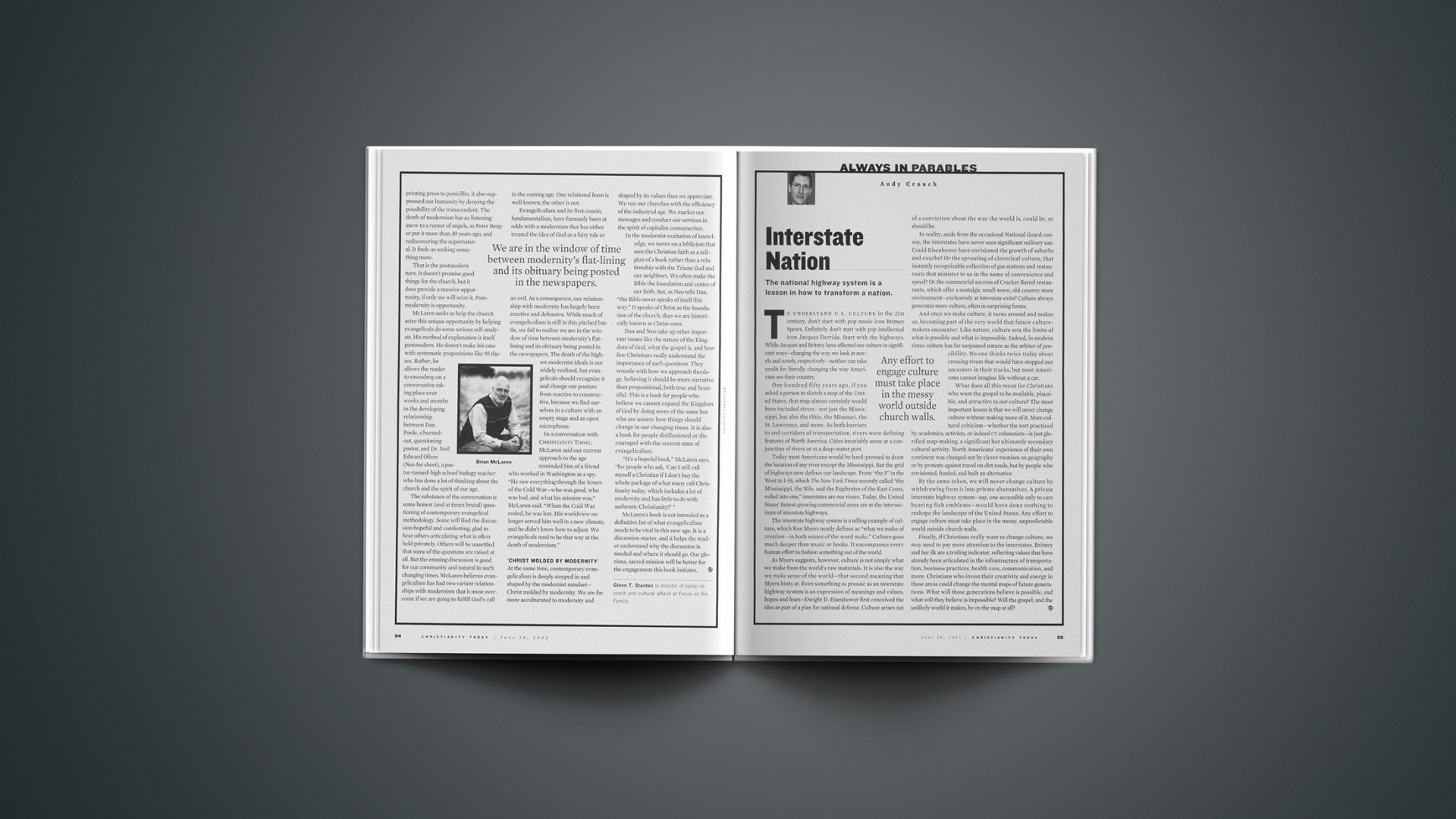To understand U.S. culture in the 21st century, don’t start with pop music icon Britney Spears. Definitely don’t start with pop intellectual icon Jacques Derrida. Start with the highways. While Jacques and Britney have affected our culture in significant ways—changing the way we look at novels and navels, respectively—neither can take credit for literally changing the way Americans see their country.
One hundred fifty years ago, if you asked a person to sketch a map of the United States, that map almost certainly would have included rivers—not just the Mississippi, but also the Ohio, the Missouri, the St. Lawrence, and more. As both barriers to and corridors of transportation, rivers were defining features of North America. Cities invariably arose at a conjunction of rivers or at a deep-water port.
Today most Americans would be hard-pressed to draw the location of any river except the Mississippi. But the grid of highways now defines our landscape. From “the 5” in the West to I-95, which The New York Times recently called “the Mississippi, the Nile, and the Euphrates of the East Coast, rolled into one,” interstates are our rivers. Today, the United States’ fastest-growing commercial areas are at the intersections of interstate highways.
The interstate highway system is a telling example of culture, which Ken Myers neatly defines as “what we make of creation—in both senses of the word make.” Culture goes much deeper than music or books. It encompasses every human effort to fashion something out of the world.
As Myers suggests, however, culture is not simply what we make from the world’s raw materials. It is also the way we make sense of the world—that second meaning that Myers hints at. Even something as prosaic as an interstate highway system is an expression of meanings and values, hopes and fears—Dwight D. Eisenhower first conceived the idea as part of a plan for national defense. Culture arises out of a conviction about the way the world is, could be, or should be.
In reality, aside from the occasional National Guard convoy, the interstates have never seen significant military use. Could Eisenhower have envisioned the growth of suburbs and exurbs? Or the sprouting of cloverleaf culture, that instantly recognizable collection of gas stations and restaurants that minister to us in the name of convenience and speed? Or the commercial success of Cracker Barrel restaurants, which offer a nostalgic small-town, old country store environment—exclusively at interstate exits? Culture always generates more culture, often in surprising forms.
And once we make culture, it turns around and makes us, becoming part of the very world that future culture-makers encounter. Like nature, culture sets the limits of what is possible and what is impossible. Indeed, in modern times culture has far surpassed nature as the arbiter of possibility. No one thinks twice today about crossing rivers that would have stopped our ancestors in their tracks, but most Americans cannot imagine life without a car.
What does all this mean for Christians who want the gospel to be available, plausible, and attractive to our culture? The most important lesson is that we will never change culture without making more of it. Mere cultural criticism—whether the sort practiced by academics, activists, or indeed CT columnists—is just glorified map-making, a significant but ultimately secondary cultural activity. North Americans’ experience of their own continent was changed not by clever treatises on geography or by protests against travel on dirt roads, but by people who envisioned, funded, and built an alternative.
By the same token, we will never change culture by withdrawing from it into private alternatives. A private interstate highway system—say, one accessible only to cars bearing fish emblems—would have done nothing to reshape the landscape of the United States. Any effort to engage culture must take place in the messy, unpredictable world outside church walls.
Finally, if Christians really want to change culture, we may need to pay more attention to the interstates. Britney and her ilk are a trailing indicator, reflecting values that have already been articulated in the infrastructure of transportation, business practices, health care, communication, and more. Christians who invest their creativity and energy in these areas could change the mental maps of future generations. What will those generations believe is possible, and what will they believe is impossible? Will the gospel, and the unlikely world it makes, be on the map at all?
Copyright © 2002 Christianity Today. Click for reprint information.
Related Elsewhere
Crouch is editor-in-chief of re:generation quarterly.
Many of Crouch’s other writings are available at his and his wife’s website.
Earlier Andy Crouch columns for Christianity Today include:
Amplified VersionsWorship wars come down to music and a power plug. (April 17, 2002)
Thou Shalt Be CoolThis enduring American slang leaves plenty out in the cold. (March 18, 2002)
Borrowing Against TimeWe live in a fallen world. We will die. We need to face that. (Jan. 17, 2002)
GroundedOur technologies give us an illusion of omnipresence—most of the time. (Nov. 15, 2001)
Zarathustra ShruggedWhat apologetics should look like in a skeptical age. (Sept. 5, 2001)
Consuming PassionsOne man’s “testimony” from the First Great Mammon Awakening. (July 10, 2001)
Generation MisinformationForget the latest PowerPoint seminars on Generations X-Z. (May 16, 01)
Dead Authors SocietyWe’re no longer interested in tasting death but only little morsels of cheer. (Mar. 28, 2001)
Promises, PromisesOur technology works. But all idols do at first. (Feb. 21, 2001)
A Testimony in ReverseI have discovered how inconvenient it can be when God actually does speak. (Feb. 5, 2001)
Crunching the NumbersA modest proposal for measuring what really matters in church life. (Dec. 20, 2000)










